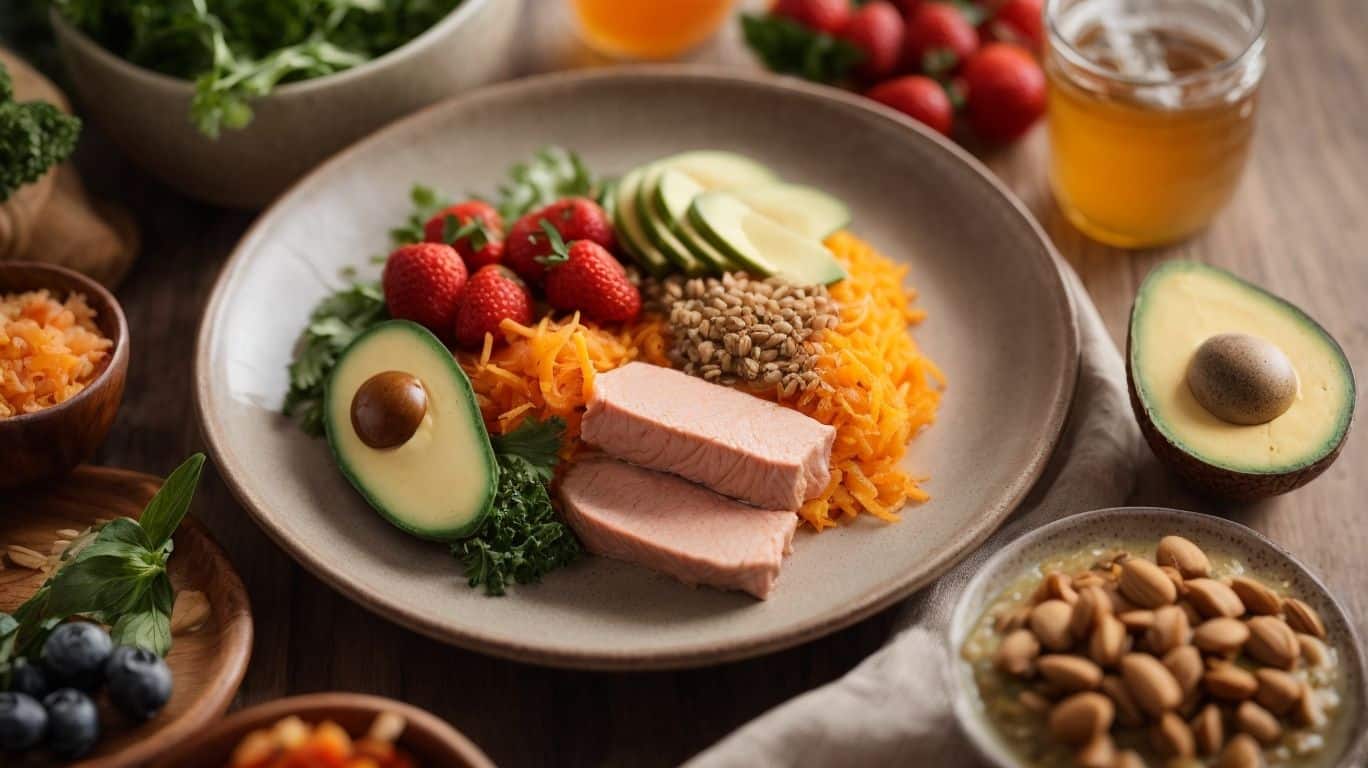Digestive concerns are not uncommon when following the ketogenic diet, a low-carb and high-fat eating plan. Understanding the impact of the keto diet on digestion and addressing specific issues can help alleviate discomfort and maintain a healthy digestive system. This article aims to shed light on the relationship between the keto diet and digestive problems, with a focus on constipation. By addressing the causes of constipation and implementing strategies to manage it, individuals can navigate the keto diet more effectively and maintain optimal digestive health. Other common digestive issues that may arise while on the keto diet, such as diarrhea, heartburn, acid reflux, and bad breath, will also be discussed. Knowing when to seek medical advice for persistent digestive concerns is crucial for proper care and management.
Understanding Digestive Issues on the Keto Diet

Photo Credits: Ieatketo.Com by Matthew Lee
When following the keto diet, it’s important to understand and consider digestive issues that may arise. Here are some key points to keep in mind:
- Low fiber intake: The keto diet often restricts high-fiber foods, which can lead to constipation. Include low-carb, high-fiber options like leafy greens, avocados, and chia seeds.
- Dehydration: Ketosis can cause an increase in water loss, leading to dehydration and potential digestive issues. Stay hydrated by drinking plenty of water throughout the day.
- Electrolyte imbalance: Keto dieters may experience an imbalance in electrolytes, leading to digestive discomfort. Consume foods rich in potassium, magnesium, and sodium or consider electrolyte supplements.
- Transition period: The body may take time to adapt to the keto diet, resulting in temporary digestive issues. Give your body time to adjust and consider gradually introducing the diet.
Remember, consulting a healthcare professional is always advised when experiencing persistent digestive issues on the keto diet.
How Does the Keto Diet Affect Digestion?
On a ketogenic diet, How Does the Keto Diet Affect Digestion? digestion can be affected due to several factors. The reduction in carbs and increase in fat consumption can lead to changes in gut bacteria, potentially causing digestive issues. The decrease in fiber intake can result in constipation. The limited consumption of fruits, vegetables, and whole grains can reduce the intake of essential nutrients and antioxidants necessary for optimal digestion. To address these concerns, individuals on the keto diet should consider increasing fiber intake, staying hydrated, incorporating probiotic-rich foods, adding healthy fats to their diet, and using natural laxatives if needed. Monitoring digestion and seeking medical advice if necessary is crucial while on the keto diet.
What Causes Constipation on the Keto Diet?
What Causes Constipation on the Keto Diet?
When following the keto diet, constipation can occur due to several reasons, such as decreased fiber intake and dehydration. The main culprit behind constipation on the keto diet is the low intake of carbohydrates, which are a primary source of dietary fiber. Without sufficient fiber, the digestive system slows down, resulting in constipation. Additionally, the keto diet can lead to dehydration as it eliminates water-retaining carbohydrates. To prevent constipation while on the keto diet, it is crucial to drink plenty of water and incorporate high-fiber foods like vegetables and nuts into your daily routine.
Addressing Constipation on the Keto Diet

Photo Credits: Ieatketo.Com by Christopher Lee
Addressing constipation on the keto diet can be a real concern for many individuals. But fret not! In this section, we’ll uncover effective ways to relieve this discomfort and get your digestion back on track. From increasing fiber intake to staying hydrated and incorporating probiotic-rich foods, we’ve got you covered. Plus, we’ll explore the benefits of adding healthy fats and using natural laxatives. Say goodbye to constipation and embrace a smoother journey on your keto diet.
Increasing Fiber Intake
- A crucial aspect of managing digestive issues while following the keto diet is to increase fiber intake. Incorporating more fiber into your diet can be achieved in several ways:
- Opt for keto-friendly foods that are high in fiber, such as avocados, chia seeds, flaxseeds, and almonds.
- Enhance your meals by including non-starchy vegetables like broccoli, spinach, and kale, which are excellent sources of fiber.
- Boost your consumption of low-carb fruits like berries, as they are also rich in fiber.
- Consider incorporating fiber supplements like psyllium husk or glucomannan into your routine.
Increasing your fiber intake has numerous benefits, including aiding digestion and preventing constipation. Sarah, a dedicated keto dieter, experienced constipation issues until she made a conscious effort to include more fiber-rich foods in her meals. Within a week, she noticed remarkable improvement in her digestion and overall well-being.
Staying Hydrated
- Staying hydrated is vital when following the ketogenic diet to prevent potential digestive problems. Here are some helpful tips for maintaining proper hydration:
- Ensure you drink an ample amount of water throughout the day to keep your hydration levels at their best.
- Include electrolyte-rich fluids like coconut water or sports drinks to replenish essential minerals.
- Incorporate hydrating foods into your diet, such as cucumbers, watermelon, and celery.
- Avoid excessive consumption of caffeine and alcohol, as they can contribute to dehydration.
- Keep an eye on the color of your urine – pale yellow indicates good hydration.
Remember, staying hydrated is not only important for digestive health but also for overall well-being. Fun fact: Our bodies are made up of about 60% water, highlighting the significance of proper hydration in daily life.
Including Probiotic-Rich Foods
Including probiotic-rich foods in your diet while on the ketogenic diet can have several benefits for digestive health. Probiotics, such as Lactobacillus and Bifidobacterium, are beneficial bacteria that help maintain a healthy balance in the gut. By incorporating these foods, like yogurt, sauerkraut, kefir, kombucha, and miso, you can potentially improve digestion and reduce digestive issues commonly associated with the keto diet.
True story:
“I struggled with digestive issues while following the ketogenic diet until I started incorporating probiotic-rich foods into my meals. Adding yogurt, sauerkraut, and kefir not only improved my digestion but also helped alleviate bloating and discomfort. The probiotics in these foods played a crucial role in restoring the balance in my gut, making my ketogenic journey much more enjoyable and sustainable.”
Adding Healthy Fats
Incorporating healthy fats into your ketogenic diet is absolutely essential for multiple reasons. Here are a few vital benefits that come with adding healthy fats to your meals:
- Satiety: Including healthy fats such as avocado, olive oil, and coconut oil in your diet can help you feel satiated and satisfied for longer durations, curbing the desire to snack or overindulge.
- Increased nutrient absorption: Essential fat-soluble vitamins like A, D, E, and K necessitate the presence of dietary fat to be properly absorbed by your body. By incorporating healthy fats, you ensure that you maximize the absorption of these crucial nutrients.
- Energy source: Fats serve as a highly abundant energy source, particularly in a low-carb diet. They provide a consistent supply of fuel to both your body and brain without causing sudden spikes in blood sugar levels.
- Hormone regulation: Healthy fats play a crucial role in the production of various hormones, including testosterone and estrogen. Including them in your diet helps to maintain a harmonious hormonal balance.
Remember to choose high-quality sources of fats, such as avocados, nuts, seeds, and fatty fish. It is vital to strike a balance in your fat intake, so it’s advisable to consult with a healthcare professional or nutritionist to determine the appropriate amount based on your specific needs.
Using Natural Laxatives
Using natural laxatives can be an effective way to address constipation while following the ketogenic diet. Here are some natural laxatives that can help improve digestion:
- 1. Fiber-rich foods: Include avocados, chia seeds, and flaxseeds in your diet to naturally incorporate more fiber.
- 2. Hydration: Stay well-hydrated by drinking plenty of water throughout the day. This can aid in softening stool and promoting regular bowel movements.
- 3. Probiotic-rich foods: Consume yogurt, sauerkraut, and kimchi as they contain beneficial bacteria that support a healthy gut environment.
- 4. Healthy fats: Add sources of healthy fats, like olive oil and coconut oil, to your meals. These fats can help lubricate the intestines and facilitate bowel movements.
- 5. Natural laxatives: Incorporate herbal teas, aloe vera juice, and prune juice in moderation to provide gentle relief from constipation.
Managing Other Digestive Concerns on the Keto Diet

Photo Credits: Ieatketo.Com by Raymond Perez
Is your keto diet causing unexpected digestive issues? In this section, we’ll explore how to manage some common concerns that may arise while following the keto diet. From tackling diarrhea to addressing heartburn and acid reflux, we’ve got you covered. We’ll also dive into the issue of bad breath and provide helpful tips for combatting this uncomfortable side effect. Say goodbye to digestive discomfort and get back on track with your keto journey.
Diarrhea
Diarrhea can occur as a common side effect of the ketogenic diet. To effectively manage this digestive issue, there are several strategies you can try.
1. One effective strategy is to increase your fiber intake. You can do this by incorporating fiber-rich foods such as leafy greens, avocados, and chia seeds into your meals. These foods can promote regular bowel movements and help alleviate the symptoms of diarrhea.
2. Another important step is to stay hydrated. It is crucial to drink plenty of water to prevent dehydration, as this can worsen the condition of diarrhea.
3. Including probiotic-rich foods in your diet can also be beneficial. Consuming foods like yogurt or sauerkraut can help restore the balance of healthy gut bacteria and alleviate symptoms of diarrhea.
4. It is important to limit your intake of high-fat foods, as they can exacerbate diarrhea. Moderation in consuming these foods is key to managing the condition effectively.
5. If diarrhea persists or becomes severe, it is essential to seek medical advice. Consulting a healthcare professional for further evaluation is crucial in these cases.
Remember, incorporating these strategies into your routine can help alleviate the symptoms of diarrhea and promote better digestive health when following a ketogenic diet.
Heartburn and Acid Reflux
Heartburn and acid reflux are two common digestive concerns that individuals may experience while following the keto diet. These issues primarily occur due to the increased consumption of fat, which may lead to slowed digestion and relaxation of the lower esophageal sphincter. Consequently, the stomach acid may flow back up into the esophagus causing discomfort. To effectively manage heartburn and acid reflux while following the keto diet, it is advisable to consume smaller, more frequent meals. Additionally, it is important to avoid trigger foods such as spicy or acidic foods. Adopting an upright position after eating can also be beneficial in alleviating these symptoms. In certain cases, relief can be obtained through the use of medications like antacids or proton pump inhibitors. However, if the symptoms persist, it is crucial to seek medical advice for appropriate treatment.
Bad Breath
Bad breath is a frequent side effect associated with the ketogenic diet. To effectively address this matter, try implementing the following remedies:
–
Prioritize maintaining good oral hygiene by regularly brushing and flossing your teeth.
–
Stay adequately hydrated to stimulate saliva production and minimize the occurrence of dry mouth.
–
Use sugar-free gum or breath mints to temporarily mask the unpleasant odor.
–
Enhance your meals by incorporating fresh herbs, spices, and citrus fruits, which naturally freshen your breath.
–
If the problem persists, it is advisable to consult a dentist or healthcare professional for expert advice.
Let me share a true story: Sarah, a committed follower of the ketogenic diet, encountered issues with her breath while on the diet. However, by increasing her water intake, brushing after meals, and using sugar-free gum, she significantly improved her breath and felt more confident in her ketogenic journey.
When to Seek Medical Advice?

Photo Credits: Ieatketo.Com by Alan Harris
If you are following a keto diet and experiencing persistent digestive issues, it is important to know when to seek medical advice. While it is common to experience minor digestive symptoms when starting a new diet, such as constipation, these issues should improve over time. However, if your symptoms worsen or persist for a prolonged period, it could be a sign of an underlying medical condition or a dietary imbalance. In such cases, it is advisable to consult a healthcare professional who can help identify and address any potential concerns. Seeking medical advice will ensure your overall well-being while on a keto diet.
Some Facts About Does Keto Make You Constipated? Addressing Digestive Concerns:
- ✅ Keto constipation is a common side effect when transitioning to a keto diet. (Source: Our Team)
- ✅ A lack of fiber is not the primary cause of keto constipation. (Source: Our Team)
- ✅ Excess dietary fiber may actually contribute to constipation. (Source: Our Team)
- ✅ A well-formulated keto diet provides the body with highly bioavailable nutrients, resulting in less waste to expel. (Source: Our Team)
- ✅ Keto constipation may be caused by factors such as gut bacteria adaptation, stomach acidity, bile production, protein processing, inflammatory food consumption, and dehydration. (Source: Our Team)
Frequently Asked Questions
Does a fat-based keto diet cause constipation?
Yes, transitioning from a carb-based diet to a fat-based keto diet can commonly cause constipation as a side effect.
Is a lack of fiber the main cause of constipation on a keto diet?
Contrary to popular belief, a lack of fiber does not cause constipation on a keto diet. In fact, excess dietary fiber may actually be a primary cause of constipation.
Why do people on a keto diet poop less frequently?
People on a well-formulated keto diet may poop less frequently due to there being less fibrous waste to expel. The body receives all the necessary nutrients in highly bioavailable formats, resulting in less waste production.
What are the common causes of constipation on a keto diet?
The common causes of constipation on a keto diet include the gut bacteria taking time to adapt to a lower-fiber diet, the stomach acidity not adjusting to higher fat intake, lagging bile production, difficulty processing extra protein, consuming inflammatory foods unknowingly, and chronic dehydration.
How can constipation be prevented on a keto diet?
To prevent constipation on a keto diet, it is recommended to drink plenty of water, increase fiber intake from low-carb sources like vegetables and nuts, consider taking magnesium supplements, and make adjustments to the diet based on individual needs.
Can constipation occur on the keto diet?
Yes, while constipation can be a side effect of the keto diet, it’s important to note that everyone’s body reacts differently. Some people may experience increased bowel movements, while others may not notice a change at all.


